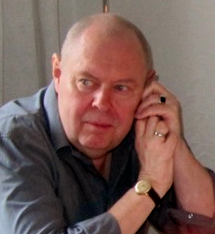People
Wall veteran: 'Reuters was something special'
Friday 1 November 2013
 Volker Warkentin, a veteran correspondent for the German language service in Berlin who helped Reuters win one of the biggest headlines of the 20th century, retired yesterday after a 35-year career. Warkentin, pictured, whose byline often graced the international service file from Germany over the decades, was an encyclopaedia of information for generations of journalists at Reuters in Germany.
Volker Warkentin, a veteran correspondent for the German language service in Berlin who helped Reuters win one of the biggest headlines of the 20th century, retired yesterday after a 35-year career. Warkentin, pictured, whose byline often graced the international service file from Germany over the decades, was an encyclopaedia of information for generations of journalists at Reuters in Germany.
He was at the famous news conference on 9 November 1989 when East German politburo member and government spokesman Guenter Schabowski announced, almost by accident, that the Berlin Wall would be opened. At the end of an otherwise stultifyingly tedious, hour-long press conference, after many journalists had already left the small, stuffy, windowless room on the first floor of East Berlin’s International Press Centre, Schabowski quietly announced that East German citizens would be getting Reisefreiheit - or freedom to travel.
“Therefore, um, we have decided today, um, to implement a regulation that allows every citizen of the German Democratic Republic, um, to, um, leave East Germany through any of the border crossings,” said Schabowski. He appeared scarcely to believe his own words and we were all dumbfounded. What did he just say? Schabowsky was asked when the new rule would take effect.
“That comes into effect - according to my information - immediately, without delay,” Schabowski stammered, shuffling through the papers spread in front of him as he sought in vain for more information. It later emerged the announcement was not supposed to be released until 4:00 am the next morning. He also meant to say East Germans could apply for visas in an orderly manner at the appropriate state agency. The sudden rush to the border that so overwhelmed the guards there was the last thing he had in mind. But that is how the Berlin Wall was opened that evening.
“My German service colleague Herbert Rossler-Kreuzer and I looked at each other in disbelief,” Warkentin said. “‘That’s a snap,’ we said in unison, already writing the top-priority report in our heads. I sprinted up three flights of stairs to the Reuters office with the biggest piece of news in my life. Years of heavy smoking didn’t seem to matter. I was gasping for breath but managed to blurt out the news to colleagues sitting at computers. The headline alert read: EAST GERMANS ALLOWED TO LEAVE TO WEST GERMANY EFFECTIVE IMMEDIATELY - SCHABOWSKI SAYS. We were two minutes ahead of the competition.”
Warkentin, a West German native, remembers walking to the Berlin Wall later that night. “I’ll never forget the chill that ran down my spine when I walked through the Brandenburg Gate,” he said. “Long after midnight I finished my last story and headed home, a few kilometers west of the border in West Berlin. Normally, it was easy to pass quickly through the closely guarded border crossing when I showed my press pass and West German passport. But on this night the crossings were jam-packed with East Berliners driving over to have a look at the West. I don’t usually get emotional - about anything. But the sight of these usually vacant border crossings filled with hordes of people celebrating the end of the Cold War got to me. I pulled over to the side of the road and started crying.”
He also remembers covering East-West spy swaps at the bucolic Glienicker Bridge separating West Berlin from East Germany in a remote corner of the city near Potsdam, such as in 1986 when human rights campaigner Anatoly Sharansky and three Western agents were exchanged for a group of Eastern agents. “There were no cell phones in those days,” Warkentin said. “So I called the news in on a telephone line that Reuters had especially installed there.”
Reuters was a prosperous company in that era, Warkentin said. “Reuters was something special. Reuters reports had a weight to them in those days, like an eternal truth carved in stone. To hear other media quoting us with the line ‘...according to a report by the Reuters news agency’ had a super sound to it back then. Unfortunately, those days are long gone. Times have changed and Reuters is no longer the company that I felt so closely attached to. Thomson Reuters might be the necessary response to the financial and media crises, but part of the joy of working at Reuters has faded with each round of austerity and cutbacks in staffing. I sometimes ask myself if Reuters itself knows where it’s heading.”
- « Previous
- Next »
- 419 of 579